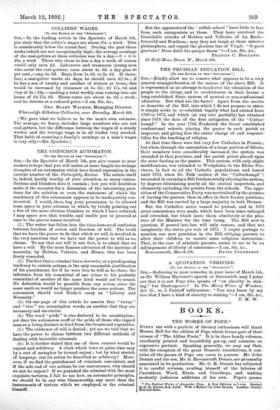THE PRUSSIAN EDUCATION BILL.
[To THE EDITOR OF TEE " SPECTATOR:] SIR,—Kindly allow me to remove what appears to be a very general misapprehension of the nature of the above Bill. It is represented as an attempt to hand over the education of the people to the clergy, and to revolutionise in their favour a long-established State system of neutral or non-confessional education. But what are the facts ? Apart from the merits or demerits of the Bill, into which I do not propose to enter, it simply seeks to re-establish legally what had existed from 1763 to 1872, and which (at any rate partially) has obtained since 1879, the date of the first mitigation of the " Cultur- kampf." In the year 1763, Frederick the Great established confessional schools, placing the pastor in each parish as inspector, and giving him the entire charge of and responsi- bility for the teaching of religion.
At that time there were but very few Catholics in Prussia ; but when, through the annexation of a large portion of Silesia, their numbers were considerably increased, the system was extended to that province, and the parish priest placed upon the same footing as the pastor. This system, with only slight modifications, was extended to Westphalia, to the Rhine Pro- vinces, in fact to all the Catholic populations, and lasted until 1872, when Dr. Falk (author of the " Culturkampf ") succeeded in carrying a Bill fundamentally altering the system, by degrees eliminating nearly all the clerical inspectors, and ultimately excluding the priests from the schools. The oppo- sition of the Conservative Party was neutralised by the promise of leaving the pastors then in office in their former positions, and the Bill was carried by a large majority in both Houses..
But the Catholics never ceased to protest, and in 1879 great concessions were made, which have been since enlarged and extended, but which leave them absolutely at the plea- sure of the Minister for the time being. The Bill now in question, if passed into law, will only restore, and that not completely, the status quo ante of 1872. I ought perhaps to mention one new provision in the Bill, obliging parents to allow their children to receive some religious instructior. That, in the case of atheistic parents, seems to me to be an infringement of liberty of conscience.—I am, Sir, &c.,


































 Previous page
Previous page